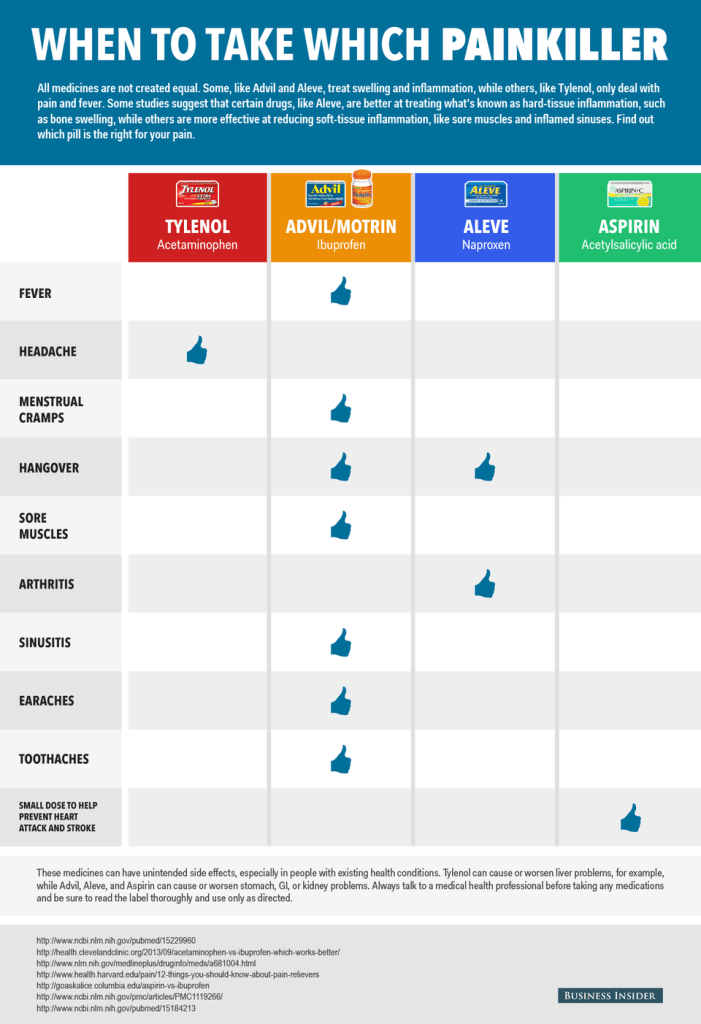It's hard to know which painkiller will help which pain you're having. Some headaches respond to Advil, some seem to get better faster with Tylenol. Business Insider put together this helpful infographic that outlines the difference between Advil, Aleve, and Tylenol, and notes which pain reliever to pull out of the medicine cabinet for a particular ailment, be it a toothache or muscle ache.
Videos by Wide Open Country
What's the Difference Between Advil, Tylenol, Aleve, and Asprin?
A few things to note. First, if you have any questions at all about the right pain reliever, ask your doctor or another medical professional. Sometimes the right pain killer depends on things like other medical conditions you might have (like high blood pressure, heart disease or liver disease), your age, and how much alcohol you drink every week. Also, the generic versions of these painkillers are just as effective as the brand names.
As the infographic notes, the information shows the outcomes of drug studies that suggest which type of pain reliever works best for each condition. That doesn't mean the Advil doesn't work on headaches or Aleve doesn't work for menstrual cramps.
Pain relievers do work in different ways. Medicines like Advil or Motrin (ibuprofen) and Aleve (naproxen or naproxen sodium) are both NSAIDs (Non-Steroidal Anti-Inflammatory Drug); they're both anti-inflammatory drugs, which means they reduce swelling. That's why something like Aleve is good for arthritis and Motrin is good for sore muscles.
Tylenol (acetaminophen), on the other hand, doesn't help swelling, so it's mostly used to relieve pain like headaches or other minor aches. And you'll notice that aspirin is used these days pretty much only to help prevent heart attack or strokes. Each type of pain reliever has some common side effects, for example, the FDA warns that NSAIDs may cause an upset stomach. But there are also more serious side effects that can affect things like kidney function and heart failure. Follow the instructions on the label or from your medical professional and be aware of potential interactions with other medications.
For example, if you're taking an over-the-counter medication for a cold or cough, check to see if it also has acetaminophen before you pop a Tylenol along with it to relieve fever. You may be taking more of the painkiller than you think you are if you're taking multiple kinds of medicine during the same time period.

For Headaches, Figure Out What Headache You Have
For headaches, the pain reliever that works best may depend on the kind of headache you have. According to the chart, Tylenol provides the best pain relief for a headache, but if you have migraines or tension headaches, you may want to try one of the combination pain relievers like Excedrin, which mixes acetaminophen, aspirin, and caffeine.
For Sinus Pain, Use Ibuprofen
For sinusitis (or basically a sinus infection), ibuprofen seems to be the best at getting rid of the pain and pressure. But you might also try breathing in warm, moist air either from a hot shower or by holding your head over a bowl of hot water (cover your head with a towel to get the full steamy effect). For an extra bit of sinus-clearing, place one or two drops of peppermint oil in the bowl of water (it's strong, so you really don't need more than a couple of drops).
For Muscle Pain, Use Ibuprofen
For muscle pain, ibuprofen seems to work best. But if you're worried about taking too many pain relievers, there are a couple of other things you can try as well. Pickle juice has been shown to relieve sore muscles and, of course, there's nothing like a soak in a hot bath to relieve muscle pain.
This post was originally published on February 14, 2019.





